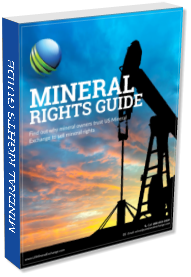
Mineral Rights and Medicaid Eligibility
At US Mineral Exchange we commonly get asked about mineral rights and medicaid eligibility. If you are trying to qualify for medicaid, your mineral rights could be an asset that disqualifies you from medicaid. However, the rules can get complicated and this article will help point you in the right direction. The most important thing to understand is that the rules vary from one state to another! In addition, your specific family situation will play a role in your eligibilty. A single mother, disabled individual, or elderly couple will all have different eligibility depending upon the state.

FREE GUIDE
Download our free mineral rights guide now! Learn more about your mineral rights.

Garrett Phelan
CEO of US Mineral Exchange with over 27 years of experience in the oil and gas industry. For nearly two decades, he has helped individuals, families, trusts, and non-profits navigate the complexities of mineral and royalty rights to achieve the highest sale prices.
Widely recognized as an industry expert, with an unwavering commitment to a client-first philosophy and extensive industry knowledge, he has been featured in Hart Energy, Yahoo Finance, and the Permian Basin Petroleum Association magazine.
Mineral Rights as Income or an Asset
If you’re applying for Medicaid and also own mineral rights, it’s important to understand how these assets might impact your eligibility. Mineral rights can affect both your monthly income and your total asset value — two critical factors in determining qualification. While the rules vary by state, this article explains how mineral rights may be treated during the Medicaid application process and offers guidance to help you estimate value conservatively.
Mineral Rights as Income
When applying for Medicaid, your monthly income plays a key role in determining eligibility. If your mineral rights generate royalty income, that income will likely count toward the monthly income threshold.
Since royalty payments often fluctuate, a fair way to determine average monthly income is to use the net income from the past six months. Follow these steps:
- Add up the net income from your royalty checks for the last six months.
- Divide that total by six to calculate your average monthly income.
In most cases, the net amount — the figure you actually deposit — is the correct value to use. However, some royalty statements include both a gross and net payment amount. According to Texas Medicaid guidance:
- If the difference between the gross and net amounts is due to income taxes withheld or windfall profit tax deductions, use the gross amount.
- If the difference is due to production or severance taxes (which is much more common), use the net amount. These taxes are considered production costs and are therefore excluded from gross income.
It is extremely uncommon for royalty checks to include income tax withholding. This usually happens only when incorrect paperwork was submitted to the operator, resulting in a 28% backup withholding. Unless that applies to you, the net amount on your check stub is the correct figure to use when calculating Medicaid income eligibility.
To determine your average monthly royalty income, assuming you don’t have backup withholding:
- Add the actual deposit amounts from your royalty checks for the past six months.
- Divide that total by six.
This six-month average is, in our opinion, a fair and reasonable estimate of your current monthly royalty income.
Keep in mind, many variables can affect future royalty income. New wells may be drilled, existing wells may be shut in, or re-completions might occur. Because of these uncertainties, predicting future royalty income is extremely difficult. That’s why we believe the six-month net average is likely the most reliable figure for Medicaid eligibility purposes.
Mineral Rights as an Asset
In addition to income, Medicaid also considers your total assets when determining eligibility. While each state sets its own rules, many apply a cap on the total value of countable assets. Some states may even exclude mineral rights as assets if the income they generate is low. For example, The Garrett Law Firm notes that in Texas, mineral rights may be excluded if they generate less than $6,000 per year.
However, for broader guidance, let’s assume your state does not offer this exclusion. How do you calculate the asset value of mineral rights?
There is no universally accepted formula. What follows is a conservative, experience-based approach that may help. Always consult with a qualified Medicaid attorney or accountant to ensure compliance with your state’s specific regulations.
The value of your mineral rights depends on their status: producing, leased, or non-producing. Each category carries a different estimated value for Medicaid purposes.
Producing Mineral Rights
If you are currently receiving royalty checks, you hold producing mineral rights. In our experience, a reasonable estimate of asset value for Medicaid is:
40 times your average monthly royalty income.
For example, if your average monthly royalty income over the past three months is $100, your mineral rights might be valued at:
$100 × 40 = $4,000
This estimate assumes you would need to sell quickly, and that a buyer would pay roughly 40 months’ worth of royalty income. However, keep in mind this does not apply if your income is temporarily inflated by new wells, as future checks may decline.
Note: The only way to determine actual market value is to sell your mineral rights on the open market. These estimates are for Medicaid purposes only.
Leased Mineral Rights
If your mineral rights are under an active oil and gas lease but do not yet generate royalty income, they are considered leased but non-producing. Typically, buyers value leased mineral rights at 2 to 3 times the lease bonus amount.
For a conservative Medicaid estimate, we recommend:
2 × lease bonus amount
Again, this is a rough estimate. The real value may be higher or lower depending on buyer interest, location, and development activity.
Note: Selling mineral rights in a competitive auction is the best way to establish their true market value.
Non-Producing Mineral Rights
If your mineral rights are not leased and generate no royalty income, they are considered non-producing. These assets are typically difficult to sell and often carry little to no value.
According to Texas Medicaid guidelines, non-producing mineral rights may be listed at $100 in value.
We believe this is a fair assumption in most states unless you have received a recent offer. If someone has made you a written offer within the past three months for more than $100, you may need to report that amount instead.
Consulting with a Medicaid Attorney and Accountant
Navigating Medicaid eligibility is complex. Both your income and assets must be reviewed carefully. Because each state has unique rules, and your personal situation may involve additional factors, professional guidance is essential.
We strongly recommend speaking with a qualified Medicaid attorney and/or accountant in your state. They can help you correctly report your mineral rights and avoid errors that could delay or jeopardize your application.
The information provided here reflects our experience within the mineral rights industry and is intended to be educational only. Always consult legal and financial experts before making decisions related to Medicaid eligibility.
Legal Disclaimer
This article is for informational purposes only and does not constitute legal or financial advice. US Mineral Exchange is not liable for decisions made based on this content. Always consult with a qualified Medicaid attorney and/or accountant before applying for Medicaid.
Popular Content
- Sell Mineral Rights
- Mineral Rights Value
- Calculate Value
- Market Value
- Mineral Rights Buyers
- Mineral Rights Appraisal
- Mineral Rights Brokers
- Should you Sell Mineral Rights
- Never Sell Mineral Rights
- 10 Helpful Tips
- Mineral Interest Types Explained
- Common Mistakes
- Mineral Rights & Taxes
- Medicaid & Mineral Rights
- Common Q&A
Common Questions
The more information you can provide about your property the better! We can give you a better idea about the value of selling mineral rights if you provide more information. The most important thing we need is for you to answer the questions and provide your state and county.
If you have the required documents to list, providing those is extremely helpful!
Absolutely not! When you inquire at US Mineral Exchange we will not be putting any pressure on you to sell. We will help answer any questions you have whether you are interested in selling or not.
At US Mineral Exchange, we take privacy very seriously. We will NEVER sell your information or use it without your consent. When you send us documentation or tell us about your property, that information does not go outside our company without your consent. Even when you list a property for sale on our website, we strictly control who has access to the information about your listing so that only legitimate buyers will be able to see property details.
Many mineral owners make the mistake of getting an offer and quickly selling. They then accept an offer far below market value because they felt pressure to sell. There is nearly always a better price available.
Imagine you were selling a home. Would you get the best price from a random person who walks up and makes you an offer? No way! Now imagine you list the home on the MLS where thousands of potential buyers know your house is for sale. The key to getting the best price is competition. Our guide to selling mineral rights explains everything.
The reason that so many mineral owners decide to sell mineral rights at US Mineral Exchange is access to our large network of mineral rights buyers. Our goal is to help you get top dollar for selling mineral rights by getting your property in front of a huge audience of buyers. This allows buyers to compete against one another which ensures you get fair market value for selling mineral rights.
There are absolutely no cost to list your property. When you locate a buyer by listing your property with us, we are paid a commission directly by the buyers closing agent. This means you never have any out of pocket expenses ever. We only get paid if we can get you a better price than the current offer you have in hand.

FREE GUIDE
Download our free mineral rights guide now! Learn more about your mineral rights.


